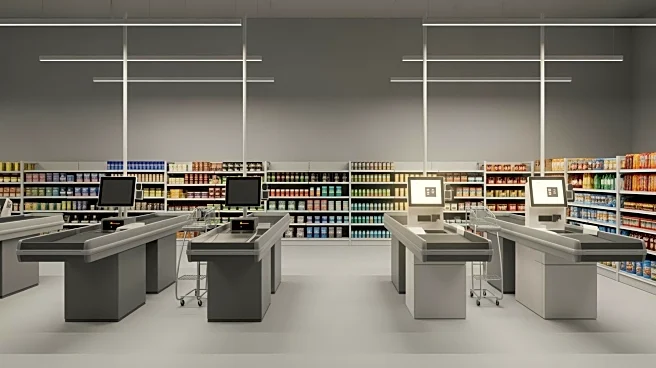What's Happening?
Massachusetts legislators are considering a bill that aims to regulate the number of self-checkout stations in grocery stores across the state. Sponsored by Democratic state Senator Paul Feeney, the bill,
titled 'An Act Regulating Self-Checkouts in Grocery Establishments,' proposes that the 2,445 grocery stores in Massachusetts be limited to eight self-service checkout stations per location. The legislation requires at least one manual checkout station for every two self-checkout stations, with non-compliance resulting in fines equivalent to a retail clerk's full day of pay and benefits. This initiative comes in response to concerns about increased theft and longer wait times associated with self-checkout systems, as well as the potential impact on employment opportunities for retail workers.
Why It's Important?
The proposed legislation in Massachusetts highlights the ongoing debate over automation in retail and its impact on employment. Self-checkout systems have been widely adopted to reduce wait times and alleviate staff stress, but they also raise concerns about job displacement and increased theft. By limiting the number of self-checkout stations, the bill seeks to preserve 'solid middle-class working-class jobs' and ensure that human employees remain integral to the grocery shopping experience. If passed, this legislation could set a precedent for other states considering similar measures, potentially influencing the balance between automation and human employment in the retail sector.
What's Next?
If the bill gains traction, Massachusetts grocery stores will need to adjust their checkout configurations to comply with the new regulations. Retailers may face logistical challenges in implementing these changes, including potential costs associated with increasing manual checkout stations. The bill's progress will be closely monitored by stakeholders in the retail industry, including store owners, employees, and consumer advocacy groups. The outcome could influence future legislative efforts in other states, as policymakers weigh the benefits of automation against the need to protect jobs and address consumer concerns.
Beyond the Headlines
The move to regulate self-checkout stations in Massachusetts could spark broader discussions about the ethical implications of automation in retail. As technology continues to evolve, businesses must navigate the balance between efficiency and the social responsibility of maintaining employment opportunities. This legislation may prompt retailers to explore innovative solutions that integrate technology while preserving human roles, potentially leading to new models of customer service and employee engagement.








